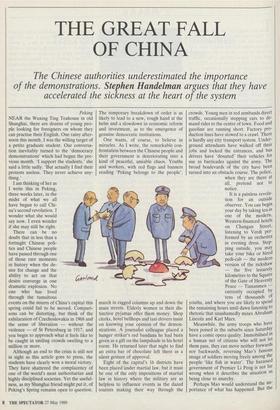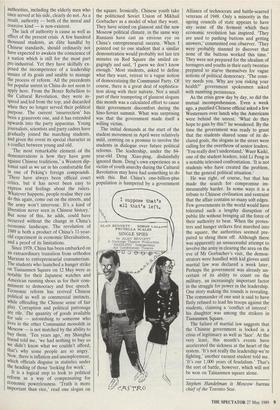THE GREAT FALL OF CHINA
The Chinese authorities underestimated the importance accelerated the sickness at the heart of the system
Peking NEAR the Wuxing Ting Teahouse in old Shanghai, there are dozens of young peo- ple looking for foreigners on whom they can practise their English. One rainy after- noon this month, I was the willing target of a petite graduate student. Our conversa- tion inevitably turned to the 'democracy demonstrations' which had begun the pre- vious month. 'I support the students,' she said a little sadly. 'But actually I find their protests useless. They never achieve any- thing.'
I am thinking of her as I write this in Peking, three weeks later, in the midst of what we all have begun to call Chi- na's second revolution. I wonder what she would say now. I even wonder if she may still be right.
Although an end to the crisis is still not in sight as this article goes to press, the students have clearly won a moral victory. They have shattered the complacency of one of the world's most authoritarian and highly disciplined societies. Yet the useful- ness, as my Shanghai friend might put it, of Peking's Spring remains open to question. The temporary breakdown of order is as likely to lead to a new, rough hand at the helm and a slowdown in economic reform and investment, as to the emergence of genuine democratic institutions.
One wants, of course, to believe in miracles. As I write, the remarkable con- frontation between the Chinese people and their government is deteriorating into a kind of peaceful, amiable chaos. Youths and workers, with red flags and banners reading 'Peking belongs to the people', march in ragged columns up and down the main streets. Elderly women in their dis- tinctive pyjamas offer them money. Shop clerks, hotel bellhops and taxi drivers insist on knowing your opinion of the demon- strations. A journalist colleague placed a hunger striker's red bandana he had been given as a gift on the lampshade in his hotel room. He returned later that night to find an extra bar of chocolate left there as a silent gesture of approval.
Eight of the capital's 16 districts have been placed under martial law, but it must be one of the only impositions of martial law in history where the military are as helpless to influence events as the dazed tourists making their way through the crowds. Young men in red armbands direct traffic, occasionally stopping cars to de- mand rides to the centre of town. Food and gasoline are running short. Factory pro- duction lines have slowed to a crawl. There is hardly any city transport system. Under- ground attendants have walked off their jobs and locked the entrances, and bus drivers have 'donated' their vehicles for use as barricades against the army. The broad boulevards of the city have been turned into an obstacle course. The police, when they are there at all, pretend not to notice.
It is a painless revolu- tion for an outside observer. You can begin your day by taking tea in one of the modern, Western-financed hotels on Changan Street, listening to Verdi per- formed by an orchestra in evening dress. Step- ping outside, you may take your bike or hired pedi-cab — the modern version of the rickshaw — the five leisurely kilometres to the Square of the Gate of Heavenly Peace — Tiananmen — currently occupied by tens of thousands of youths, and where you are likely to spend the remaining hours until dawn listening to rhetoric that unashamedly mixes Abraham Lincoln and Karl Marx.
Meanwhile, the army troops who have been poised in the suburbs since Saturday • have a comic opera quality. Immobilised in a human net of citizens who will not let them pass, they can move neither forwards nor backwards, reversing Mao's famous image of soldiers moving freely among the people 'like fish in water'. The harassed government of Premier Li Peng is not far wrong when it describes the situation as being close to anarchy. Perhaps Mao would understand the im- portance of what has happened. But the authorities, including the elderly men who once served at his side, clearly do not. As a result, authority — both of the moral and coercive kind — is non-existent.
The lack of authority is cause as well as effect of the present crisis. A few hundred thousand students, an elite handful by Chinese standards, should ordinarily not have expected to awaken the conscience of a nation which is still for the most part pre-industrial. Yet they have skilfully ex- posed the incompetence of a leadership unsure of its goals and unable to manage the process of reform. All the precedents for popular unrest in China do not seem to apply here. From the Boxer Rebellion to the Cultural Revolution, they were in- spired and led from the top, and discarded when they no longer served their political purpose. The current 'insurrection' has been a grassroots one, and it has extended upwards into the party apparatus. Young journalists, scientists and party cadres have gradually joined the marching students, and given the event its special character as a conflict between young and old.
`The most remarkable element of the demonstrations is how they have gone against Chinese traditions,' a Western dip- lomat said as we sat in his comfortable flat in one of Peking's foreign compounds. There have always been official court critics, but it has never been easy to express real feelings about the rulers. Whatever happens, people realise they can do this again, come out on the streets, and the army won't intervene. It's a kind of liberation never seen in Chinese history.' But none of this, he adds, could have occurred without the change in China's economic landscape. The revolution of 1989 is both a product of China's 11-year- old experiment in economic liberalisation, and a proof of its limitations.
Since 1978, China has been embarked on an extraordinary transition from orthodox Marxism to entrepreneurial consumerism. The students who launched a hunger strike on Tiananmen Square on 12 May were as notable for their Japanese watches and American running shoes as for their com- mitment to democracy and free speech. Economic reform has revived Chinese Political as well as commercial instincts, while offending the Chinese sense of fair play. Corruption and political patronage are rife. The quantity of goods available for sale — astonishing to someone who lives in the other Communist monolith in Moscow — is not matched by the ability to buy them. 'Ten years ago,' my Shanghai friend told me, 'we had nothing to buy so we didn't know what we couldn't afford; that's why some people are so angry.' Now, there is inflation and unemployment, which officials disguise in statistics under the heading of those 'looking for work'. It is a logical step to look to political reform as a way of compensating for economic powerlessness. 'Truth is more important than rice,' read one slogan on the square. Ironically, Chinese youth take the politicised Soviet Union of Mikhail Gorbachev as a model of what they want. They have seized on glasnost and the new Moscow political climate, in the same way Russians have cast an envious eye on China's entrepreneurial success. When I pointed out to one student that a similar demonstration would probably not last ten minutes on Red Square she smiled en- gagingly and said, 'I guess we don't know enough.' Most students, asked to define what they want, retreat to a vague notion of democratising the Communist Party. Of course, there is a great deal of sophistica- tion along with their naivete. Not a small part of their trumpeting of glasnost slogans this month was a calculated effort to cause their government discomfort during the Sino-Soviet summit. What was surprising was that the government made itself a willing victim.
The initial demands at the start of the student movement in April were relatively mild, centring on a promise to involve the students in dialogue over future political reforms. The leadership, under the 84- year-old Deng Xiao-ping, disdainfully ignored them. Deng's own experience as a victim of youth anarchy during the Cultural Revolution may have had something to do with this. But China's one-billion-plus population is hampered by a government Alliance of technocrats and battle-scarred veterans of 1949. Only a minority in the ageing councils of state appears to have any sense of the ferment which their economic revolution has inspired. 'They are used to pushing buttons and getting answers,' commented one observer. 'They were probably stunned to discover that none of the buttons worked this time.' They were not prepared for the idealism of teenagers and youths in their early twenties prepared to starve themselves for vague notions of political democracy. 'The coun- try needs you. Why are you risking your health?' government spokesmen asked with numbing persistence.
As the crisis grew day by day, so did the mutual incomprehension. Even a week ago, a puzzlied Chinese official asked a few Westerners over lunch why the Americans were behind the unrest. 'What do they hope to gain by this?' he wondered. By the time the government was ready to grant that the students shared some of its de- clared goals, the slogans in the street were calling for the overthrow of senior leaders. `You really don't understand,' Wuer Kaiki, one of the student leaders, told Li Peng in a notable televised confrontation. 'It is not students who have created the problem, but the general political situation.' He was right, of course, but thai has made the search for compromise im- measurably harder. In some ways it is a tribute to Chinese civilisation and restraint that the affair contains so many soft edges.
Few governments in the world would have tolerated such a lengthy disruption of public life without bringing all the force of their authority to bear. When the protes- ters and hunger strikers first marched into the square, the authorities seemed pre- pared to shrug them off. Although there was apparently an unsuccessful attempt to involve the army in clearing the area on the eve of Mr Gorbachev's visit, the demon- strators were handled with kid gloves until martial law was declared a week later.
Perhaps the government was already un- certain of its ability to count on the military, an increasingly important factor in the struggle for power in the leadership. One story making the rounds is revealing.
The commander of one unit is said to have flatly refused to lead his troops against the students, claiming a 'conflict of interest': his daughter was among the strikers in Tiananmen Square.
The failure of martial law suggests that the Chinese government is locked in a crisis of legitimacy as well as 'face'. At the very least, this month's events have accelerated the sickness at the heart of the system. 'It's not really the leadership we're fighting,' another earnest student told me. `It's our 1,000 years of feudalism.' That's the sort of battle, however, which will not be won on Tainanmen square alone.
Stephen Handelman is Moscow bureau chief of the Toronto Star.



















































 Previous page
Previous page